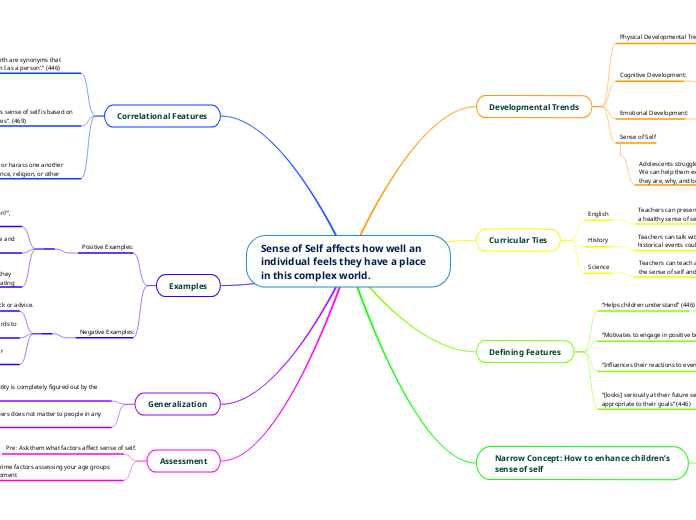Sense of Self affects how well an individual feels they have a place in this complex world.
Developmental Trends
Physical Developmental Trends:
They look tired because they stay up late into the night.We can encourage them to use their time wisely by learning effective study skills.
Cognitive Development:
We see students learning deep concepts that they can understand and present to others.We can help them learn how to elaborate by guiding them through learning strategies. Help them figure out how they learn best.
Emotional Development:
Adolescents become overly stressed, and we can help them find ways to cope with that stress. Stress can be good if we can learn how to manage it well.
Sense of Self
Adolescents struggle to understand and accept who they are. We can help them explore options so that they can decide who they are, why, and be happy with themselves.
Curricular Ties
English
Teachers can present literature that will teach students about a healthy sense of self and what looks, sounds, and feels like.
History
Teachers can talk with their students about how different historical events could have affected people’s sense of self.
Science
Teachers can teach about the psychology and sociology behind the sense of self and how it affects someone.
Defining Features
“Helps children understand” (446)
As Children start to understand who they are more, they can understand things outside of themselves better as they have a self-awareness around them.
“Motivates to engage in positive behaviors” (446)
Their sense of self allows them to understand others as they understand others as they understand themselves.
“Influences their reactions to events” (446)
Their sense of self will influence how they react do different events as they will start to understand how to react to events depending on their identity.
“[looks] seriously at their future self, [making] choices appropriate to their goals” (446)
And finally their sense of self allows them to look towards their future self and make goals to work towards and makes steps to hit those goals as they see their future self.
Narrow Concept: How to enhance children’s sense of self
“Adults are more effective in nurturing children’s sense of self when they understand how children think, feel, and express themselves” (469)“Teachers and other professionals can support children’s perceptions by treating students with compassion and arranging for instruction and experiences that are growth-promoting. When students have not achieved well at school, teachers can adjust assignments and monitor performance so that students will begin to succeed and see themselves as competent learners. Students must not be able to tease or harass one another based on gender, ethnicity, appearance, religion, or other factors”(469-470).
Correlational Features
“The terms self-esteem and self-worth are synonyms that address the question, ‘How good am I as a person’.” (446)
People’s understanding of self-esteem, self-worth, and sense of self can become warped, we have to be careful to distinguish between them, especially their sense of self. “Children’s self-concept and self-worth are closely related” (446), however this does not mean they are the same thing.
“To a considerable degree, children’s sense of self is based on their own prior successes and failures”. (469)
Oftentimes people see Children at certain ages as simply being able to bounce back from hardships and ignore failures in the past. It is important to know that once you hit a certain age, they will start to remember their successes and failures and use that in tandem with other things to develop their sense of self throughout their developmental stages
“Students must not be able to tease or harass one another based on gender, ethnicity, appearance, religion, or other factors” (471)
Sometimes teachers think that teasing someone is okay as long as that person being teased is okay with it. However this is very often hard to really comprehend and understand when you are not the person being teased and you as a teacher do not understand the dynamics of the friendships involved, or if there truly even are any.
Examples
Positive Examples:
Children ask themselves “who am I?”, “Am I a good person?", "What do I believe?".
They will adopt standards for evaluating their appearance and accomplishments that they have learned from others.
They will take on different personalities depending on he people that they are interacting with, and recognize that they are doing that. They will amend how they act towards creating an identity.
Negative Examples:
Children avoid reviewing/accepting feedback or advice.
They will conclude that they are moody or indecisive rather than analyzing how they are acting.
Generalization
Over:A person’s self identity is completely figured out by the time they’re past age 18.
Everyone is continuing to find and edit their self identity. The journey never stops.
Under:The opinion of others does not matter to people in any developmental stage.
The opinions of others always affect people's self identity. It will have a lesser impact later on, but it will still carry weight.
Assessment
Pre: Ask them what factors affect sense of self.
Post: What are the prime factors assessing your age groups sense of self development
